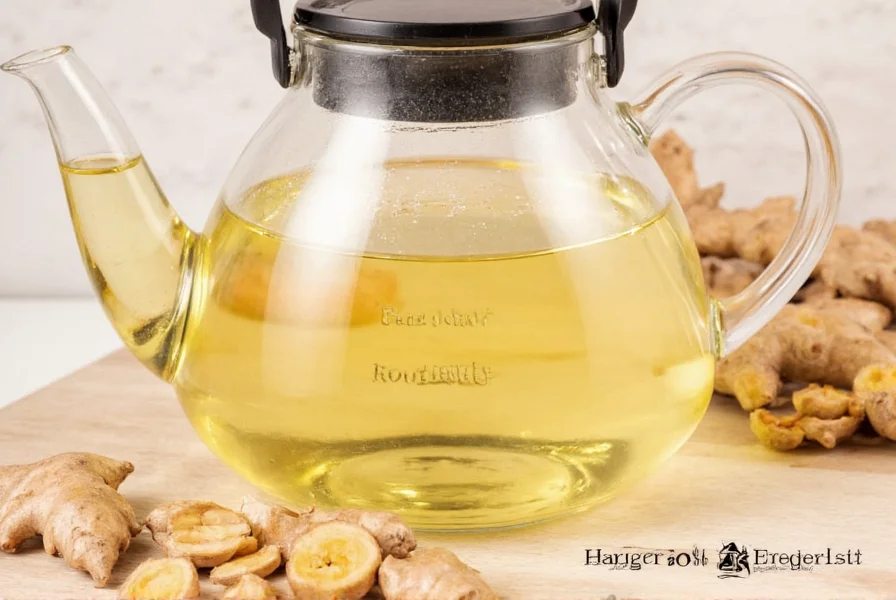When navigating dietary choices during pregnancy, understanding which natural remedies are safe becomes crucial. Ginger tea has emerged as one of the most commonly recommended options for expectant mothers experiencing morning sickness. This article examines the scientific evidence behind ginger tea consumption during pregnancy, providing clear guidance based on current medical understanding.
Understanding Ginger's Benefits for Pregnancy Nausea
Ginger root contains bioactive compounds called gingerols that have demonstrated anti-nausea properties in multiple clinical studies. Research published in the Obstetrics & Gynecology journal found that pregnant women who consumed 1 gram of ginger daily experienced significantly reduced nausea symptoms compared to placebo groups. The American College of Obstetricians and Gynecologists (ACOG) recognizes ginger as an effective non-pharmacological option for managing mild to moderate pregnancy nausea.
Unlike some anti-nausea medications, ginger works through multiple pathways in the digestive system without crossing the blood-brain barrier, making it a preferred natural remedy for many healthcare providers. However, the effectiveness varies among individuals, with some women reporting dramatic improvement in morning sickness symptoms while others notice minimal effects.
Safety Guidelines for Ginger Tea Consumption During Pregnancy
While generally considered safe, proper dosage is critical when drinking ginger tea while pregnant. Medical experts typically recommend:
| Trimester | Recommended Maximum Daily Amount | Special Considerations |
|---|---|---|
| First | Up to 250mg (about 1/4 cup) | Consult doctor first; some recommend avoiding entirely in early pregnancy |
| Second | Up to 1 gram (1-2 cups) | Monitor for any unusual symptoms |
| Third | Up to 1 gram (1-2 cups) | Avoid within 2 weeks of delivery due to potential blood-thinning effects |
Exceeding recommended amounts may lead to heartburn, gas, or mouth irritation. More concerning, excessive ginger consumption could potentially affect blood clotting or interact with certain medications. The National Center for Complementary and Integrative Health notes that while ginger is generally well-tolerated, its effects on pregnancy outcomes require more extensive research.
When Ginger Tea Might Not Be Recommended
Certain pregnancy conditions warrant avoiding ginger tea or requiring medical clearance before consumption:
- History of recurrent miscarriage
- Placenta previa or other bleeding disorders
- Gestational diabetes (ginger may affect blood sugar)
- Upcoming cesarean delivery (due to potential blood-thinning effects)
- Multiple pregnancies (twins, triplets)
Pregnant women taking blood thinners, diabetes medications, or certain heart medications should exercise particular caution, as ginger may interact with these pharmaceuticals. Always disclose any herbal supplement use to your obstetrician during prenatal visits.
Preparing Safe Ginger Tea During Pregnancy
Not all ginger tea products are created equal when considering safety during pregnancy. To ensure you're consuming a safe preparation:
- Use fresh ginger root rather than pre-packaged blends that may contain additional herbs
- Limited steeping time (5-7 minutes) to control potency
- Avoid adding excessive sugar to prevent unnecessary calorie intake
- Choose organic ginger when possible to minimize pesticide exposure
- Start with weaker concentrations and gradually increase if well-tolerated

Evidence-Based Recommendations from Medical Authorities
Multiple medical organizations have evaluated ginger's safety profile for pregnancy nausea:
- The American Pregnancy Association states: "Ginger tea is considered safe during pregnancy when consumed in moderate amounts."
- ACOG's Committee Opinion notes: "Ginger is a safe and effective treatment for nausea and vomiting of pregnancy."
- The European Medicines Agency classifies ginger as generally safe for short-term use during pregnancy
- The MotherToBaby information service reports no increased risk of birth defects with typical ginger consumption
However, these organizations consistently emphasize that individual medical circumstances vary, and personalized medical advice should always supersede general recommendations.
Alternative Natural Remedies for Pregnancy Nausea
If ginger tea isn't suitable for your specific pregnancy circumstances, consider these evidence-based alternatives:
- Lemon water with a pinch of baking soda
- Peppermint tea (in moderation)
- Vitamin B6 supplementation (with doctor's approval)
- Acupressure wristbands
- Frequent small meals with protein-rich snacks
Remember that what works for one pregnant woman may not work for another, as morning sickness triggers and remedies are highly individual.
When to Consult Your Healthcare Provider
While ginger tea is generally safe for most pregnant women, contact your healthcare provider if you experience:
- Increased heartburn or gastrointestinal discomfort
- Unusual bleeding or spotting
- Heart palpitations or dizziness
- Nausea that prevents keeping any food or liquids down
- Symptoms of hyperemesis gravidarum (severe, persistent vomiting)
Your obstetrician can help determine whether ginger tea is appropriate for your specific pregnancy and medical history, and can suggest alternative solutions if needed.










 浙公网安备
33010002000092号
浙公网安备
33010002000092号 浙B2-20120091-4
浙B2-20120091-4